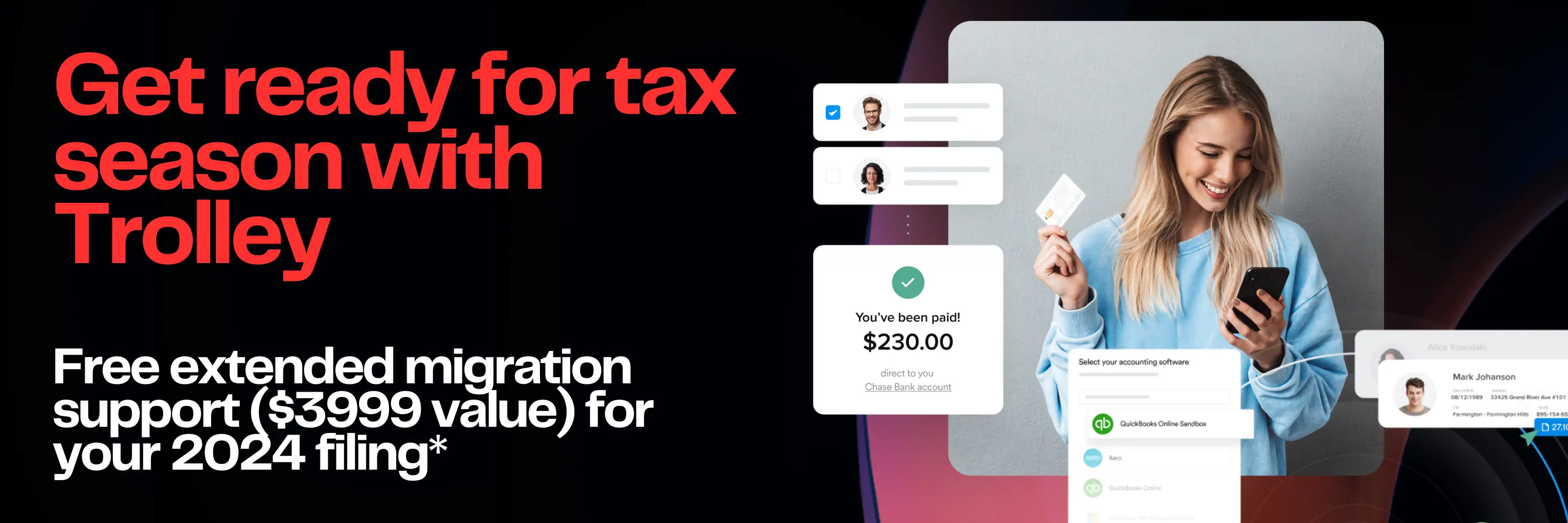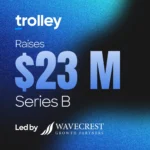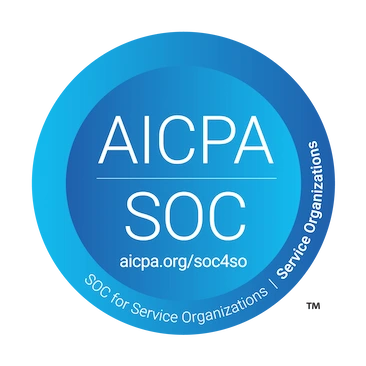11/22/2023 update: The IRS has announced another delay of its Form 1099-K threshold changes. For calendar year 2023, with reporting due in January 2024, the reporting threshold for TPSOs remains at $20,000 in gross amount of aggregate payments and 200 transactions.
The IRS plans to propose a $5,000 reporting threshold for the following year, with the aim of eventually working towards the $600 threshold. This change does not affect state reporting thresholds—many of which are already $600.
The Trolley Tax team is pleased to announce that we now offer the ability to generate and file Form 1099-K in full compliance with IRS standards.

With the reporting threshold for 1099-Ks planned to be reduced to $600, we’re bringing our users a new feature that will be key for product managers looking to address this major issue facing many online businesses this tax season.
Following the release of its DAC7 compliance product in June 2023, the Trolley Tax team is thrilled to keep the momentum going with an integrated 1099-K production and filing solution.
“Whenever we make a major change or upgrade to our Tax product, we want to make sure we’re making an informed decision and covering all our bases,” says Myles Foster, Trolley’s Tax Product Manager. “Looking at our current customer base, and the companies we’re best positioned to serve in the years to come, marketplaces—just one form that third party settlement organizations (TPSOs) can take—make up a large portion of that. By adding 1099-Ks to our supported forms, we are continuing to invest in this segment and find ways to add additional value for them.”
Now that Form 1099-K is a part of Trolley’s IRS Tax product, customers will have access to a tax center fully equipped for end-to-end contractor tax compliance management; meaning it collects data required to generate Forms W-8 and W-9, validates TINs, classifies recipients and income types as payouts are made, and is fully integrated with the IRS—including E-Filing.
This means that affected platforms, merchants, and/or TPSOs don’t need to obtain filing credentials which can be a lengthy and burdensome process—including an employee identity verification processes.
Staying compliant with new IRS guidelines
With the planned threshold change for 1099-K reporting to just $600 in gross payments for any transaction volume vs the previous threshold of $20,000 and 200 transactions, the Trolley team fully expects the number of EoY tax statements for US-based marketplaces to increase exponentially.
“Some parties that settle payments, such as small to medium size TPSOs, have historically not had heavy reporting obligations in relation to Form 1099-K due to high reporting thresholds,” says Tax Subject Matter Expert Jessalyn Dean, CPA. “Reducing the threshold to just $600 in gross payments has brought a lot of companies, that previously did not have to consider this requirement, into scope of reporting. This increase in reportable transactions will help the IRS to fill gaps in tax revenue and puts the Form 1099-K reporting threshold on par with the other Forms 1099 such as Form 1099-MISC and NEC.”
Along with that growing demand, many more companies will be required to file electronically in 2024 by virtue of the ongoing IRS initiative to phase out paper tax form filings.
Previously, electronic filing was only mandatory when filing 250 or more returns though it was counted across each separate Form 1099 type. In 2023, the IRS reduced that number to require electronic filing for 10 or more Form 1099 returns and this is now measured in aggregate across all form types.
These new rule changes could require additional staff to manage the process or alternatively, could be streamlined by automation partners like Trolley. Companies without integrated tools may struggle to maintain compliance.
“We’re more than prepared to handle an increased volume of forms in general, and we’re anticipating that with this change in regulations, the number of 1099-Ks filed will outpace the number of 1099-NECs that are currently being filed with Trolley—in the first filing season alone.” says Foster.
Additional support to bolster a growing online economy
“For platforms that operate within the internet economy, we’ve leveled up our end-of-year tax experience significantly,” says Barnett Klane, Trolley’s VP Product. “We’re consolidating payout workflows and keeping up with ever-changing tax laws. It’s important for digital marketplaces to take a proactive approach to tax compliance and to choose a partner that’s in the loop with the IRS regulations, so issuing 1099-Ks is a hurdle they won’t want to ignore.”
With more and more of the workforce turning to online marketplaces to sell goods or offer services, keeping track of these new forms of income is more important than ever. Companies who employ these contractors, creators and artists should never have to worry about wasting resources on building tools or maintaining compliance.
What this means for Trolley customers
With the addition of Form 1099-K, Trolley now has native tax support for all Forms 1099 required for paying contractors, creators, and artists—1099-K, 1099-NEC, and 1099-MISC.
This means that more platforms operating in the US will be able to take advantage of Trolley’s simplified tax info collection, validation, and end-of-year filing capabilities. Trolley gathers all the necessary information throughout the year as payments are sent and uses that to populate end-of-year Forms 1099s or Form 1042-S. Plus, our systems flag any errors before end-of-year filing, ensuring peace of mind before submitting to the IRS.
For more information about Trolley’s 1099-K tax capabilities, visit our IRS Tax Compliance page.












